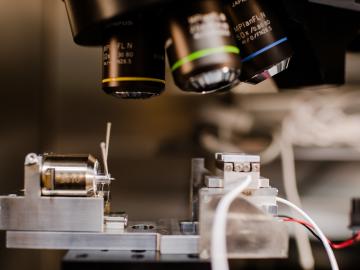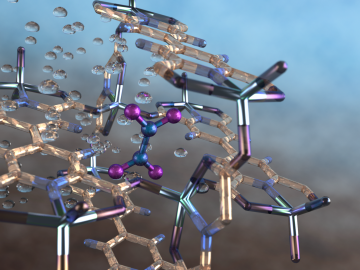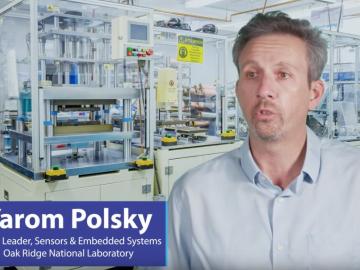
Filter News
Area of Research
- (-) Energy Science (87)
- Advanced Manufacturing (1)
- Biological Systems (1)
- Biology and Environment (96)
- Biology and Soft Matter (1)
- Computational Biology (1)
- Computational Engineering (1)
- Computer Science (2)
- Fusion and Fission (6)
- Isotopes (23)
- Materials (67)
- Materials for Computing (7)
- National Security (17)
- Neutron Science (26)
- Nuclear Science and Technology (7)
- Quantum information Science (2)
- Supercomputing (48)
News Type
News Topics
- (-) Biomedical (5)
- (-) Energy Storage (49)
- (-) Environment (33)
- (-) Isotopes (1)
- (-) Machine Learning (4)
- (-) Microscopy (6)
- 3-D Printing/Advanced Manufacturing (54)
- Advanced Reactors (5)
- Artificial Intelligence (6)
- Big Data (2)
- Bioenergy (24)
- Biology (9)
- Biotechnology (3)
- Buildings (22)
- Chemical Sciences (13)
- Clean Water (4)
- Composites (7)
- Computer Science (16)
- Coronavirus (10)
- Critical Materials (5)
- Cybersecurity (8)
- Exascale Computing (2)
- Fossil Energy (2)
- Frontier (1)
- Fusion (1)
- Grid (23)
- High-Performance Computing (4)
- Hydropower (1)
- Materials (22)
- Materials Science (16)
- Mathematics (1)
- Mercury (2)
- Microelectronics (1)
- Molten Salt (1)
- Nanotechnology (7)
- National Security (5)
- Neutron Science (10)
- Nuclear Energy (6)
- Partnerships (12)
- Physics (1)
- Polymers (6)
- Quantum Science (2)
- Security (6)
- Simulation (2)
- Space Exploration (1)
- Summit (4)
- Transportation (38)
Media Contacts

Each year, approximately 6 billion gallons of fuel are wasted as vehicles wait at stop lights or sit in dense traffic with engines idling, according to US Department of Energy estimates.
A team of scientists led by Oak Ridge National Laboratory found that while all regions of the country can expect an earlier start to the growing season as temperatures rise, the trend is likely to become more variable year-over-year in hotter regions.

Energy storage startup SPARKZ Inc. has exclusively licensed five battery technologies from the Department of Energy’s Oak Ridge National Laboratory designed to eliminate cobalt metal in lithium-ion batteries. The advancement is aimed at accelerating the production of electric vehicles and energy storage solutions for the power grid.

The formation of lithium dendrites is still a mystery, but materials engineers study the conditions that enable dendrites and how to stop them.

An international team of scientists, led by the University of Manchester, has developed a metal-organic framework, or MOF, material

Students often participate in internships and receive formal training in their chosen career fields during college, but some pursue professional development opportunities even earlier.

Elizabeth Herndon believes in going the distance whether she is preparing to compete in the 2020 Olympic marathon trials or examining how metals move through the environment as a geochemist at the Department of Energy’s Oak Ridge National Laboratory.

In the vast frozen whiteness of the central Arctic, the Polarstern, a German research vessel, has settled into the ice for a yearlong float.

The National Alliance for Water Innovation, a partnership of the Department of Energy’s Oak Ridge National Laboratory, other national labs, university and private sector partners, has been awarded a five-year, $100 million Energy-Water Desalination Hub by DOE to address water security issues in the United States.

Electro-Active Technologies, Inc., of Knoxville, Tenn., has exclusively licensed two biorefinery technologies invented and patented by the startup’s co-founders while working at the Department of Energy’s Oak Ridge National Laboratory. The technologies work as a system that converts organic waste into renewable hydrogen gas for use as a biofuel.


